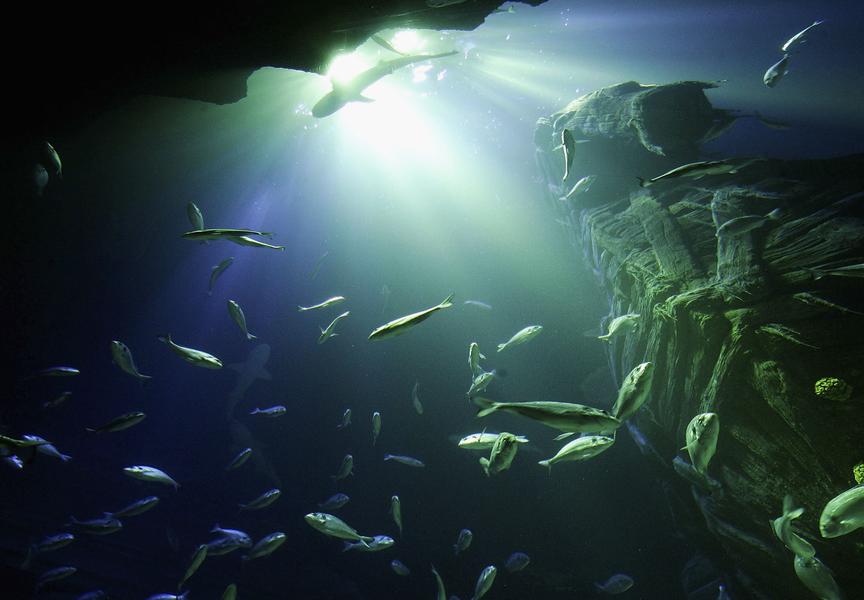U.S., NASA will give $17 million to explore marine biodiversity


A free daily email with the biggest news stories of the day – and the best features from TheWeek.com
You are now subscribed
Your newsletter sign-up was successful
The U.S. has announced a new prototype system to "gauge national marine biodiversity," NASA reports. The system will include three demonstration projects, which together will cost roughly $17 million.
The projects, which will be completed over the next five years, will be funded by NASA and the National Oceanic and Atmospheric Administration (NOAA), in conjunction with contributions from the U.S. Department of the Interior's Bureau of Ocean Energy Management.
The prototype observation networks will use NASA satellite data from marine environments in four locations in the U.S: the Florida Keys; Monterey Bay and the Santa Barbara Channel in California; and the continental shelf in the Chukchi Sea in Alaska. The Shell Oil Company will also contribute funding to the Alaska project.
The Week
Escape your echo chamber. Get the facts behind the news, plus analysis from multiple perspectives.

Sign up for The Week's Free Newsletters
From our morning news briefing to a weekly Good News Newsletter, get the best of The Week delivered directly to your inbox.
From our morning news briefing to a weekly Good News Newsletter, get the best of The Week delivered directly to your inbox.
Scientists hope the projects will "lay the foundation" for the first national network to monitor biodiversity, NASA reports. The new network would include observations of every part of marine life, "at scales ranging from microbes to whales." If successful, the network could "serve as a marine resource management tool to conserve existing biodiversity and enhance U.S. biosecurity against threats such as invasive species and infectious agents," according to NASA. The network could also help scientists develop strategies for dealing with pollution and climate change.
"We now have large amounts of biologically relevant information on marine ecosystems, including global observations of ocean color and sea surface temperature from space," Woody Turner, manager of NASA's Biodiversity Research Program at NASA's Washington headquarters, said in a statement. "But we need a more effective way of combining different types of information to get a better picture of how marine ecosystems are changing if we are to sustain these important ecosystem resources."
A free daily email with the biggest news stories of the day – and the best features from TheWeek.com
Meghan DeMaria is a staff writer at TheWeek.com. She has previously worked for USA Today and Marie Claire.
-
 The broken water companies failing England and Wales
The broken water companies failing England and WalesExplainer With rising bills, deteriorating river health and a lack of investment, regulators face an uphill battle to stabilise the industry
-
 A thrilling foodie city in northern Japan
A thrilling foodie city in northern JapanThe Week Recommends The food scene here is ‘unspoilt’ and ‘fun’
-
 Are AI bots conspiring against us?
Are AI bots conspiring against us?Talking Point Moltbook, the AI social network where humans are banned, may be the tip of the iceberg
-
 Blue Origin launches Mars probes in NASA debut
Blue Origin launches Mars probes in NASA debutSpeed Read The New Glenn rocket is carrying small twin spacecraft toward Mars as part of NASA’s Escapade mission
-
 Dinosaurs were thriving before asteroid, study finds
Dinosaurs were thriving before asteroid, study findsSpeed Read The dinosaurs would not have gone extinct if not for the asteroid
-
 SpaceX breaks Starship losing streak in 10th test
SpaceX breaks Starship losing streak in 10th testspeed read The Starship rocket's test flight was largely successful, deploying eight dummy satellites during its hour in space
-
 Rabbits with 'horns' sighted across Colorado
Rabbits with 'horns' sighted across Coloradospeed read These creatures are infected with the 'mostly harmless' Shope papilloma virus
-
 Lithium shows promise in Alzheimer's study
Lithium shows promise in Alzheimer's studySpeed Read Potential new treatments could use small amounts of the common metal
-
 Scientists discover cause of massive sea star die-off
Scientists discover cause of massive sea star die-offSpeed Read A bacteria related to cholera has been found responsible for the deaths of more than 5 billion sea stars
-
 'Thriving' ecosystem found 30,000 feet undersea
'Thriving' ecosystem found 30,000 feet underseaSpeed Read Researchers discovered communities of creatures living in frigid, pitch-black waters under high pressure
-
 New York plans first nuclear plant in 36 years
New York plans first nuclear plant in 36 yearsSpeed Read The plant, to be constructed somewhere in upstate New York, will produce enough energy to power a million homes
